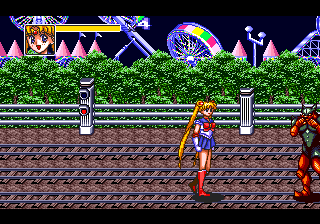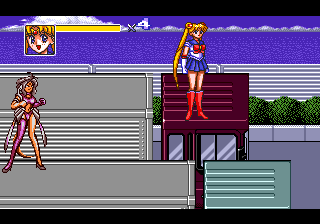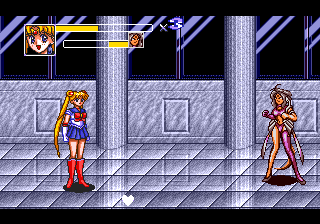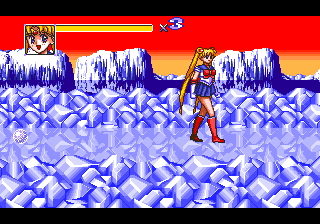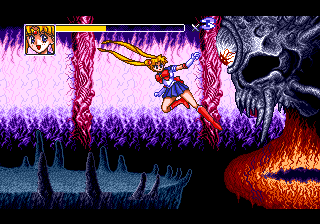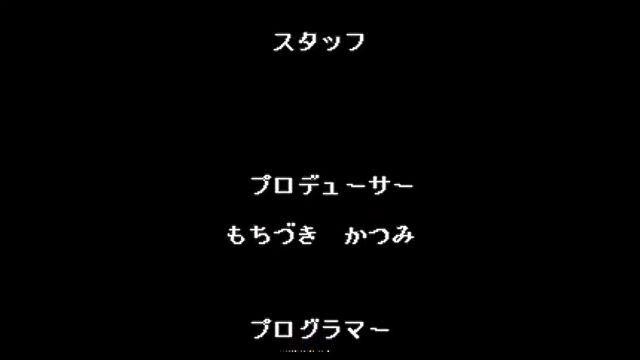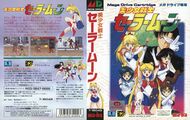Bishoujo Senshi Sailor Moon
From Sega Retro
- For the Sega Game Gear game, see Bishoujo Senshi Sailor Moon S (Game Gear).
| Bishoujo Senshi Sailor Moon | ||||||||||
|---|---|---|---|---|---|---|---|---|---|---|
| System(s): Sega Mega Drive | ||||||||||
| Publisher: Ma-Ba | ||||||||||
| Developer: Arc System Works, TNS | ||||||||||
| Licensor: Naoko Takeuchi, Kodansha, TV Asahi, Toei Douga | ||||||||||
| Original system(s): Super Famicom | ||||||||||
| Sound driver: SMPS 68000 | ||||||||||
| Genre: Action[1][2] | ||||||||||
| Number of players: 1 | ||||||||||
|
Bishoujo Senshi Sailor Moon (美少女戦士セーラームーン) is a beat 'em up arcade game based on the Sailor Moon anime and manga series for the Sega Mega Drive, developed by Arc System Works and TNS, and published by Ma-Ba. It was originally released in 1993 by Angel for the Super Famicom.
The game was released during the series' third metaseries ("Sailor Moon S"), which in a year later, the Sailor Moon series would reach North America. At the same time, the Sailor Moon series was already popular in France and Spain, these countries actually receiving a PAL localization of the original SNES version in November 1994. But despite all the aforementioned, only a Japanese version exists of the Mega Drive version with only Japanese text.
Contents
Story
| “ |
My name is Usagi Tsukino. But in reality, I am Sailor Moon, one of the five Sailor Guardians fighting to protect the moon's kingdom Silver Millennium. Suddenly, one day I saw a dream that the defeated Dark Kingdom was resurrected. In Rei's fortune, the energy of hatred restored them, I can't believe this. Once again, please forgive me Dark Kingdom! We must fight once more, Guardians. Make-up! In the name of the moon, I'll punish you! |
„ |
— Game manual and box back description, translated [1] | ||
Gameplay
The game is set in the first series of Sailor Moon, and the player takes control of one of the five heroines (Guardian Senshi). Each Senshi has some sequences of blows (![]() ), three aerial attacks (neutral, moving forward/backward, downward) (
), three aerial attacks (neutral, moving forward/backward, downward) (![]() ), and a special charge-up projectile (
), and a special charge-up projectile (![]() ).
).
Characters
Game follows the first season of the anime series, depicting the girls' battle against the Dark Kingdom, led by Queen Beryl, therefore only the orginal five sailor soldiers (Inner Senshi) are avaiable. Names in brackets are the names used by the original 1995 English localization by DIC Entertainment.
Enemies
The enemies are mostly the youma of the Dark Kingdom that appeared in the anime, but if more than one of the same kind appears at once, the others are coloured differently (a common device for this genre of games):
Stages
The game is divided into five main stages, which are subdivided into two areas (three for stage 5); with a sixth being present only in hard mode:
| Stage 1 - Juban Shopping Street (十番 商店 街) | |
|---|---|
| Area A: Shopping District of Juban Town (十番町 商店 街) Area B: Department Store's Elevator (デパート の エレベーター) Boss: Manegin (マネギン) | |
| Stage 2 - Dream Land (夢ランド) | |
| Area A: Amusement Park (遊園地) Area B: Candy House (おかし の 家) Boss: Jadeite (ジェダイト) | |
| Stage 3 - Highway (高速道路) | |
| Area A: Highway (高速道路) Area B: Secret Factory (秘密工場) Boss: Nephrite (ネフライト) | |
| Stage 4 - Starlight Tower (スターライト タワー) | |
| Area A: Starlight Tower (スターライト タワー) Sub-boss: Zoisite (ゾイサイト) (as False Sailor Moon (にせセーラームーン)) Area B: Cavern (洞窟) Boss: Kunzite (クンツァイト) | |
| Stage 5 - D Point (Dポイント) | |
| Area A: North Pole (北極) Area B: Beryl's Fortress (ベリル の 要塞) Area C: Queen Beryl's Castle (クインベリル の 城) Sub-boss: Endymion (エンディミオン) Boss: Queen Beryl (クイン ベリル) | |
| Stage 6 - Dark Kingdom (ダーク キングダム) | |
| Stage 6 is just an extra fight against Queen Metallia (クイン メタリア) |
Versions
The Mega Drive version has certain elements recycled from the Super Famicom game. It contains most of the original stages, though some were removed or replaced. Some of the boss battles are different as well, and a new hidden final boss, Queen Metallia is featured when playing on Hard Mode.
It does not contain any of the music from the original game either, with the exception of the main theme song (Moonlight Densetsu) at the title screen, bosses also have their own songs rather than a generic theme for all of them. The game has different endings for each playable character.
Production credits
- プロデューサー: もちずき かつみ
- プログラマー: わたなべ ゆきお, いけうち はるよし, はやかわ よしき, こくみい
- きかく, プレイヤーデザイン, ビジュアルデザイン: おかもと みちと
- エネミーデザイン: さだもり こうき
- マップデザイン: ゆきの かずや, さだもり こうき
- エフェクトデザイン: なかむら としろう, まつもと つよし, おはら のぶゆき, ふじた じゅんにち
- シナリオ: おはら のぶゆき
- サウンド: はた あき
- スペシャル・サンクス: ささき しげのり, パワー しおち, ゆまた ゆきお, えむ・てぃー, さいとう しゅういち, さいとう こうじ, たむら たけし, さとう あつし, わだ やすゆき, いのう ようこ
Magazine articles
- Main article: Bishoujo Senshi Sailor Moon/Magazine articles.
Promotional material
also published in:
- Beep! MegaDrive (JP) #1994-08: "August 1994" (1994-07-08)[5]
Physical scans
| Sega Retro Average | ||||||||||||||||||||||||||||||||||
|---|---|---|---|---|---|---|---|---|---|---|---|---|---|---|---|---|---|---|---|---|---|---|---|---|---|---|---|---|---|---|---|---|---|---|
|
| 52 | |
|---|---|
| Based on 6 reviews | |
Technical information
- Main article: Bishoujo Senshi Sailor Moon/Technical information.
References
- ↑ 1.0 1.1 File:BSSM MD JP Box.jpg
- ↑ 2.0 2.1 https://sega.jp/history/hard/megadrive/software_l.html (Wayback Machine: 2020-07-02 23:21)
- ↑ Beep! MegaDrive, "June 1994" (JP; 1994-05-07), page 9
- ↑ File:Bishoujo Senshi Sailor Moon MD credits.pdf
- ↑ Beep! MegaDrive, "August 1994" (JP; 1994-07-08), page 16
- ↑ 1700 igr dlya Sega, "" (RU; 2001-xx-xx), page 260
- ↑ Beep! MegaDrive, "July 1994" (JP; 1994-06-08), page 18
- ↑ Consoles +, "Octobre 1994" (FR; 1994-xx-xx), page 158
- ↑ Famitsu, "1994-07-29" (JP; 1994-07-15), page 1
- ↑ Mega Fun, "09/94" (DE; 1994-08-24), page 105
- ↑ Sega Saturn Magazine, "September 1995" (JP; 1995-08-08), page 87
| Bishoujo Senshi Sailor Moon | |
|---|---|
|
Main page | Maps | Magazine articles | Reception | Region coding | Technical information | Bootlegs | |
| Sailor Moon franchise games for Sega systems | |
|---|---|
| Bishoujo Senshi Sailor Moon (1994) | |
| Bishoujo Senshi Sailor Moon S (1994) | Bishoujo Senshi Sailor Moon SuperS (1995) | Bishoujo Senshi Sailor Moon Sailor Stars: Tokimeki Party (1996) | |
| Bishoujo Senshi Sailor Moon S (1995) | |
| Bishoujo Senshi Sailor Moon SuperS: Various Emotion (1996) | |















